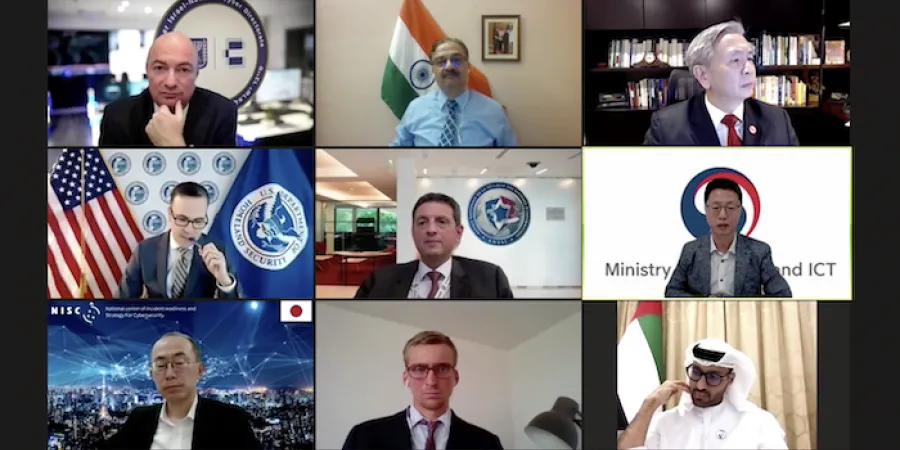Annual cyber conference of OECD, led by Israel, comes to an end
In the closing session, the heads of cyber agencies from around the world presented the cyber policies of their countries and expressed their desire to promote multinational cybersecurity cooperation. Israel's Yigal Unna said the ability to become more secure depends directly on the ability of the agencies to work together
Cybertech
| 10/06/2021
The annual conference of the Organization of Economic Cooperation and Development (OECD), led this year for the first time by the Israel National Cyber Directorate, ended yesterday (Wednesday) with joint agreement by the participating countries on the need to promote multinational cooperation in the field of cyber.
In the closing session of the conference, with the participation of the heads of six cyber agencies from OECD countries as well as Singapore, India and, for the first time, the United Arab Emirates, the representatives presented their countries' cyber policies, the way they are carried out, and their desire to further explore ways to promote multinational cybersecurity cooperation. In this framework, the countries will consider ways, methods and means of promoting security such as exchanges of information, a unified policy on identifying vulnerabilities in systems, and removal of barriers to cooperation.
Most of the countries are currently engaged in various kinds of bilateral cyber cooperation, but during the conference the heads of the agencies called for the promotion of multinational cooperation. The participants called on the OECD to consider ways of lifting barriers to enable more effective multinational cooperation between the agencies.
Yigal Unna, Director General of the Israel National Cyber Directorate, who led the session, said in his concluding remarks that "It is our responsibility to implement these policies," noting that "Our governments share values and have developed policies to promote cyber resilience," and said participants need to join forces and implement the policies together.
"We have taken a variety of measures, such as identifying critical activities, raising awareness, developing skills, promoting innovation, stimulating information sharing among stakeholders, and providing advanced technical assistance. These form an excellent baseline, but more is needed. In a global and interconnected economy, our ability to become more secure also depends directly on our ability to work together across the globe."
The conference, which was held for the third consecutive year, serves as a joint working group for governments, civilian society and industry to clarify joint policy issues as part of the dialogue led by the OECD. This year's conference whose theme was "Local challenges, global solutions" brought together representatives from close to 60 countries as well as about 40 speakers from Israel and the rest of the world.
In the closing session, the heads of cyber agencies from around the world presented the cyber policies of their countries and expressed their desire to promote multinational cybersecurity cooperation. Israel's Yigal Unna said the ability to become more secure depends directly on the ability of the agencies to work together
The annual conference of the Organization of Economic Cooperation and Development (OECD), led this year for the first time by the Israel National Cyber Directorate, ended yesterday (Wednesday) with joint agreement by the participating countries on the need to promote multinational cooperation in the field of cyber.
In the closing session of the conference, with the participation of the heads of six cyber agencies from OECD countries as well as Singapore, India and, for the first time, the United Arab Emirates, the representatives presented their countries' cyber policies, the way they are carried out, and their desire to further explore ways to promote multinational cybersecurity cooperation. In this framework, the countries will consider ways, methods and means of promoting security such as exchanges of information, a unified policy on identifying vulnerabilities in systems, and removal of barriers to cooperation.
Most of the countries are currently engaged in various kinds of bilateral cyber cooperation, but during the conference the heads of the agencies called for the promotion of multinational cooperation. The participants called on the OECD to consider ways of lifting barriers to enable more effective multinational cooperation between the agencies.
Yigal Unna, Director General of the Israel National Cyber Directorate, who led the session, said in his concluding remarks that "It is our responsibility to implement these policies," noting that "Our governments share values and have developed policies to promote cyber resilience," and said participants need to join forces and implement the policies together.
"We have taken a variety of measures, such as identifying critical activities, raising awareness, developing skills, promoting innovation, stimulating information sharing among stakeholders, and providing advanced technical assistance. These form an excellent baseline, but more is needed. In a global and interconnected economy, our ability to become more secure also depends directly on our ability to work together across the globe."
The conference, which was held for the third consecutive year, serves as a joint working group for governments, civilian society and industry to clarify joint policy issues as part of the dialogue led by the OECD. This year's conference whose theme was "Local challenges, global solutions" brought together representatives from close to 60 countries as well as about 40 speakers from Israel and the rest of the world.



